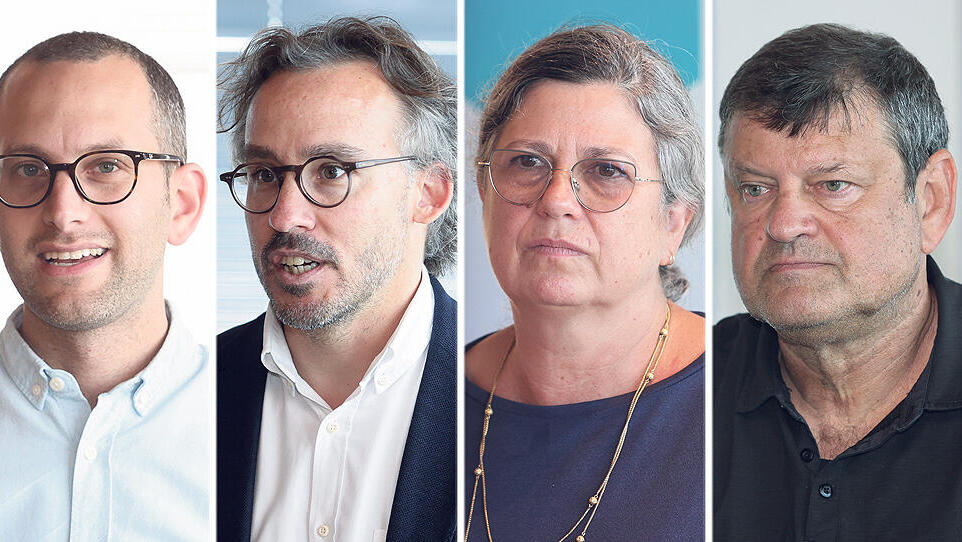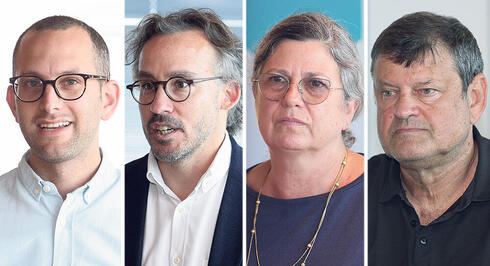
"Investors want to invest in a product with the greatest impact"
The 15 semifinalists in Calcalist and Doral Energy-Tech’s Israeli Climate Awards met with some of the leading figures in the sector
Fifteen entrepreneurs who advanced to the semifinals of the Israeli Climate Awards, a competition hosted by Calcalist and Doral Energy-Tech Ventures, met this week for a workshop and enrichment day. During the event, they received tools to maximize their activities and utilize investment opportunities, and met with some of the leading VCs and ClimateTech leaders in Israel. The event was led by Roee Furman, CEO of Doral Energy-Tech Ventures.
The goal of the competition is to identify the next big thing in Israeli high-tech in regards to the fight against the climate crisis. The winning startup, which will be announced on July 26, will receive a cash prize of 50,000 NIS ($13,652), 50,000 NIS for advertising in Calcalist, up to $50,000 for piloting its technology with Doral, 12 hours of legal consultation, and two hours of strategic consulting on intellectual property and patents from the Pearl Cohen law firm, which also hosted the workshop day in its offices. There is also an opportunity for strategic investment from Doral’s VC fund.
Dr. Tamar Moise, Head of the Climate Program at PLANETech, an organization working towards the advancement of climate tech and climate change solutions, conducted a session for entrepreneurs on ‘carbon math.’ In other words, how companies can accurately present the climate impact of their products. "You need to know how to quantify the impact," she said. "We need to describe the reduction of greenhouse gasses and carbon emissions. But there are additional parameters, such as land area, population, climate justice promotion (solutions that support populations most affected by the climate crisis and environmental impacts). All of these things can be quantified and are part of the company's climate story. It isn’t enough to make broad statements about biodiversity and pollution, but you have to break down the problem and who it affects. People want to understand in a specific and quantitative way what your impact is."
According to Moise, such quantification allows companies to provide precise data, for example, on the number of carbon emissions that their product actually saves or is capable of saving in a specific usage volume. "An investor wants to know the future impact, venture capital funds want to maximize the future impact of their investment portfolios, to invest in companies that help them achieve declared goals such as reducing emissions by a gigaton by 2050."
So, how do you start implementing such quantitative calculations? "One possible way is to rely on research to understand the potential impact. The second way is to examine the product itself, such as an electric vehicle battery, and understand how one unit of it can reduce carbon emissions and then extrapolate from that what the company is saving. The technology replaces something else, so understanding the emissions reduction compared to regular businesses is crucial. An investor wants to invest in a product that generates the largest impact."
Related articles:
These basic data points should be projected into the future, says Moise, taking into account factors such as the expected market penetration rate of the product or changes to the market over a 20-year period. The desired outcome can be described as the climate impact of the product compared to regular businesses or competing products over decades, both at the individual product level and at the overall impact level of the company.
Rami Kalish, Co-founder and Managing Partner at Pitango, spoke with entrepreneurs about the characteristics that VCs seek in ClimateTech companies. "Our role is to earn money for our investors, who provide us with full discretion," he said. "Over a period of ten years, we need to invest, influence, grow, and return much more money than what our investors have given us. We always look at potential investment. It needs to be good: Is there a large market? Does it offer a significant value proposition? Is it backed by a strong team? Is the valuation right, and so on? All of this is encompassed by impact. We cannot invest in an impact company if it doesn't meet the other criteria."
"This market is going to grow and will undergo significant transformation. The technologies we have been investing in, which were intended for other fields, will be implemented in these areas. Excellent entrepreneurs are increasingly venturing into \[ClimateTech\], including entrepreneurs from other domains who establish a second company. We are seeing more and more VCs like us entering the field. We don’t believe in buying low and selling high, so that you invest in something not particularly interesting at a low price and sell it at a high value. That's not what interests us. We want to build meaningful companies."
Cecile Blilious, Head of Impact and Sustainability at Pitango, emphasized the importance of working with corporate partners. "Pitango has major corporate investors, and they are our strategic partners," she said. " They want us to connect them with the best deals. We can learn from them about market trends and what they can offer to companies. It's a tremendous advantage."
Kalish also addressed whether it is better to receive funding from an Israeli VC or an American one. "An entrepreneur should seek a good Israeli VC that can be with them throughout the entire journey," he explained. "It's not that I’m ruling out American VCs, but they cannot be as involved as we are. Truly successful companies have a combination of Israeli and American investors."
Alejandro Solé, Chief Investment Officer at TechEnergy Ventures, described the process leading up to investing in a startup. "We try to identify the problem and map the different technological solutions that can play a role, and then we search for a suitable startup," he said. "Therefore, when we meet a startup for the first time, we already understand the problem they are trying to solve. We like projects that solve something specific, that understand what they are dealing with, and know how their technology will integrate into the market. We're not looking for a startup that solves everything, but rather one that solves a specific issue and understands everything that is happening in its field."
Shai Albaranes, Vice President of Innovation and Ventures at Orbia, described a similar process: "A company contacts us and we enter into a dialogue with them to understand the market and their solution. But in many other cases we like to build a story before we locate a specific startup."
Guy Lachman, Senior Partner at Pearl Cohen, conducted a practical workshop for entrepreneurs on building a legal framework for promoting pilots and commercial agreements between startups and corporations. "Over the years, we have accompanied hundreds of entrepreneurs who are sometimes unaware of the legal 'mines' that can arise, even in seemingly simple documents such as an NDA. Our role is to create a space that allows for proper and efficient cooperation between startups and corporations, protecting the startup's intellectual property and commercial activity, and facilitating its continued growth."
Additionally, the entrepreneurs listened to a lecture by Amir Fishelov, Co-Founder at SolarEdge and chairman of CaPow, who shared his personal journey as a startup founder in the climate field. They also attended a lecture by Deloitte on the translation of carbon credits into revenue and profit engines.
